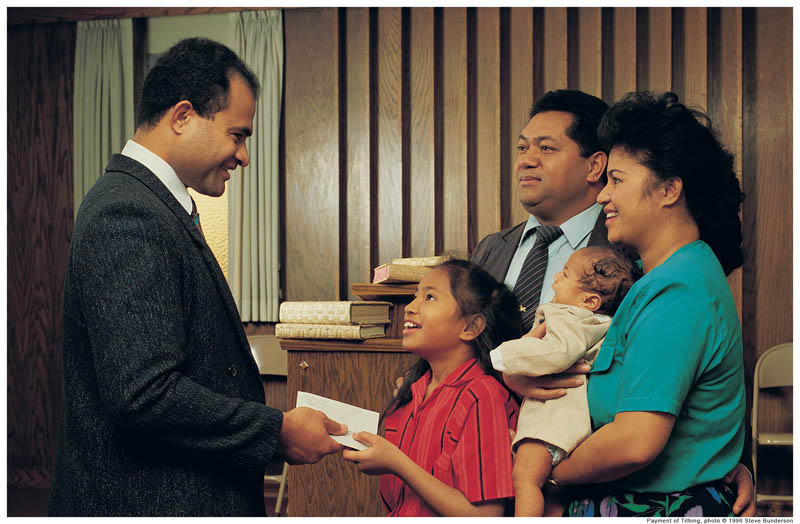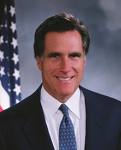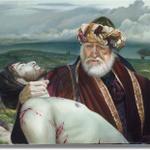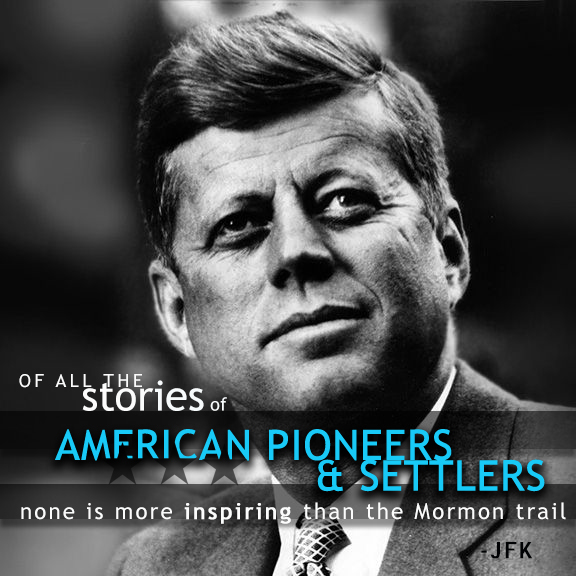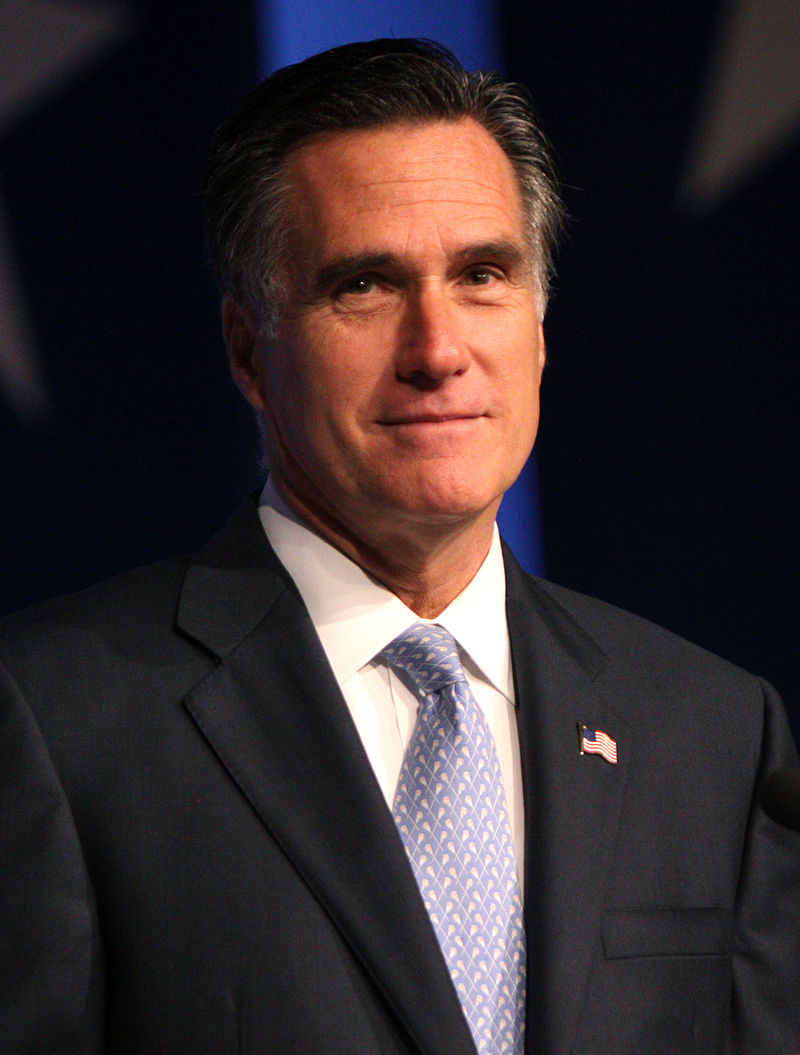 Mitt Romney is expected to announce tomorrow that he is running for the office of the President of the United States. Much has been made of his religious background and many wonder what impact his religion might have on his term of office if he’s elected. In this article, we’ll look at his religious background and how his experiences as a Mormon (the nickname for people who belong to The Church of Jesus Christ of Latter-day Saints) might affect his political leadership. We’ll also examine whether or not his presidency would give power to the Mormons, as some have speculated. Since this is a religion blog, not a political one, this article is meant only to inform readers about the religious background of Mitt Romney.
Mitt Romney is expected to announce tomorrow that he is running for the office of the President of the United States. Much has been made of his religious background and many wonder what impact his religion might have on his term of office if he’s elected. In this article, we’ll look at his religious background and how his experiences as a Mormon (the nickname for people who belong to The Church of Jesus Christ of Latter-day Saints) might affect his political leadership. We’ll also examine whether or not his presidency would give power to the Mormons, as some have speculated. Since this is a religion blog, not a political one, this article is meant only to inform readers about the religious background of Mitt Romney.
Romney comes from a long line of Mormons. His wife, Ann, is a convert. Romney was raised in an active, participating Mormon home and religion was a natural part of his daily life.
When he was nineteen years old, he, like about 38 percent of all Mormon young men, volunteered to serve a full-time mission for his church. These young men pay their own way and agree to go wherever they are sent. If they don’t know the language, they are given some training and then learn the rest by immersion into their new culture. Mitt Romney was sent to France, where he worked full-time for two and a half years. (Two years is the standard length of time for a mission.) During their missions, missionaries live by very strict rules. They have a companion—another missionary—who is with them at all times and they help each other with the rules, the work, and the study. The strict rules—no dating, television, internet, or leisure reading, for instance—help them stay focused on their work, keep the Holy Ghost present, and teach them self-discipline, a critical skill that helps them throughout their lives.
Romney’s mission was filled with challenges that forced him to grow up quickly. One day, while driving a car that held the mission president and his wife (an older couple who oversee all missionaries in a designated area), the car was hit by a drunk driver. Romney was so seriously injured he was actually declared dead by one police officer. The wife of the mission president died. Romney was not at fault, because the other driver, intoxicated, had sped around a curve, missed a turn, and ended up in Romney’s lane, but it naturally created some emotional challenges for him, as well as extensive physical pain.
However, one advantage of suffering a trauma on a mission is that there is always a great deal of work to be done. Despite his very young age—he was only 21 at the time—he and his companion were put in charge of the entire mission, since his president was recovering and coping with the death of his wife. This meant the two young adults were required to manage 300 missionaries and assist in the care of 3000 Mormons. The church sent a mission president in to provide training, but he decided the two men were doing quite well without training and left. This gave Romney his first serious experience with large-scale management and demonstrated his leadership talents. What he learned from this experience led him to go on to become what other missionaries said was the best missionary in the field. He and his companion were told to just do the minimum to keep things functioning, but instead they decided to “magnify their calling,” a Mormon term that refers to doing the very best you can. The mission had baptized 70 people the first half of that year. They set a goal to baptize 200 people total before year ended. They knew that for this to happen, all the missionaries would have to step up and be willing to work harder, study more, and pray more. Romney and his companion set out to travel the length of the mission to speak to groups of missionaries. He wanted them to make this a personal goal, not just his goal.
Mitt Romney’s mission gave him a number of skills that have proven valuable to him in his career. He learned to work hard and to be disciplined. He learned to put duty before personal needs and to lead even without training or experience. He learned to set high goals and then to figure out how to accomplish them. He also learned to be comfortable with public speaking.
Romney’s mission set a pattern of church leadership. He later served as a bishop. A bishop is a lay pastor, completing the complicated work on managing an LDS congregation while continuing to hold a regular job and raise a family. Mormons do not use a paid clergy.
While serving as bishop, he received word during a family vacation that the church building had burnt down. He raced home to figure out where his congregation could meet. The nearest building housed college students, who were about to return and would fill the church buildings each Sunday. There was not enough room for the congregation to stay there. Seven non-LDS churches offered space in their buildings and the city offered the use of town hall. Bishop Romney was grateful for their kindness and went to visit each building. Unfortunately, the congregation required 21 classrooms and many churches didn’t have that many. He understood the offers were important because some people hadn’t wanted Mormons to build in the area at all and others had taken issue with the parking lot required. He felt this could serve as an opportunity to build relationships with the community and the other churches, so he decided the congregation would rotate through the buildings that met their needs. This would both help the churches offering space to see that they were just ordinary people and also help his congregation understand members of other churches are also good people. Although it was inconvenient, they met in Town Hall for one meeting and then in a Catholic school for three months. Next they met in a Protestant Armenian church and finished out their tour in a Congregationalist church.
Romney turned a tragedy into an opportunity. The Mormons became more a part of the religious community and joined the town’s Church Council.
Mitt Romney also served in another position which earned him the title of President—but of a stake, not a country. A stake is a group of congregations and the stake president oversees the congregations in that stake. He is over the bishops of each congregation and also manages stake-wide programs.
Romney’s stake was in Boston, a highly diverse city. Many of the people in his care did not speak English and many lived in poverty. For many of these people, getting to church was a challenge. They didn’t drive and public transportation was expensive, non-existent, or unreliable. Often there were few people in the area who had cars and room for other passengers.
Romney created a three-fold plan to ease the challenges he faced. First, he felt people were more comfortable learning the gospel in their own languages. Not knowing the language of the congregation makes it difficult to learn and difficult to serve in leadership positions. To assist with this, he created small congregations that spoke a specific language. Although Mormons are assigned congregations based on their address, members who were more comfortable learning in their native language could choose to attend these congregations.
Next he created store-front or boutique congregations. These were very small congregations in inner-city areas that were easily accessible by public transportation. Because they were small in number and often had many inexperienced new members, leadership was sometimes brought in from other congregations to assist until there were enough experienced members who actually lived within the boundaries. Often they rented store space, since there were not enough people for a full church building yet. This creation is used now in other parts of the church, including Philadelphia.
Finally, he made sure congregations focused on Jesus Christ. This removed any cultural barriers for immigrants, regardless of which congregation they decided to attend. The focus was on the teachings of the Savior, not on American culture. Regardless of cultural background, any Mormon could fit in and feel at home with Jesus Christ as the centerpiece.
Although Romney brings with him the leadership and problem solving skills honed through his church work, he does not bring any mandates from church leaders. The Mormons maintain strict neutrality when it comes to political candidates and parties. They do not endorse candidates, nor do they instruct them in how to vote or lead. They do, of course, offer their views on some religious and moral subjects and work toward religiously significant goals, but they do this regardless of who is in power. Mormon political leaders are not required to take that advice any more than is any other politician. The diversity of Mormon political life is shown in the fact that there are Mormons in both major parties and Romney, Jon Huntsman (a Mormon also considering a presidential run) and Harry Reid, all very different politically, share the same Mormon faith. They bring with them certain values they hold dear, as does any candidate, but they clearly meet the standards of their own political parties despite this. Official Mormon stances do not fit neatly into any political party and their values can be found in portions of many of the existing parties. Therefore, if a Mormon is elected president, he will be making his own decisions and will not be under any obligation to lead as his church leadership might ask him to.
Read more about Mormonism and politics.
About Terrie Lynn Bittner
The late Terrie Lynn Bittner—beloved wife, mother, grandmother, and friend—was the author of two homeschooling books and numerous articles, including several that appeared in Latter-day Saint magazines. She became a member of the Church at the age of 17 and began sharing her faith online in 1992.

